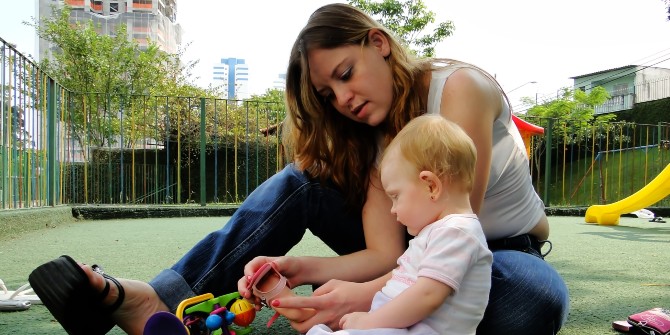Women are more likely to have lost their jobs as a result of the pandemic. Some may embrace the chance to devote themselves to their families, says Aliya Hamid Rao (LSE) – though unemployed men do not always feel the same obligation. But the evidence shows that those who quit jobs because of unpaid caregiving responsibilities have more difficulty getting back into the workforce.
Women (especially women of colour) have been more likely to lose their jobs as a result of the COVID-19 pandemic. When this happens, the effect appears to be to highlight their obligations as unpaid caregivers – not paid workers – within their families. Their subsequent unemployment may be yet another factor that erodes their participation in the workforce.
For my book Crunch Time: How Married Couples Confront Unemployment, I interviewed dozens of college-educated men and women who had lost their jobs. I also interviewed their spouses, conducted follow-up interviews, and observed some of these families to get a sense of how unemployment shapes the daily rhythm of their lives. How these affluent families respond to job loss is informative, because their social class typically sets hegemonic norms around gender – such as who in a family should participate in paid work, and for whom the domestic realm is the primary responsibility.

Families do not always acknowledge the importance of women’s income to their household. In heterosexual couples, families are reluctant to see women as breadwinners, even when they earn 80-100% of the household income. In the US, men typically continue to earn more in heterosexual families, though women contribute an increasing amount of income to their households.
I found that after losing their jobs, unemployed mothers found solace and comfort in the domestic realm. Doris*, an unemployed mother, said “I’m getting a lot of validation in being a mother; from the things my kids are achieving.” Their husbands also expected these unemployed mothers to focus on the home. Cheryl says that when she was employed, her husband “would take more turns doing things. He would help with the dinner, meals, or cleaning. Now that I’m not working, it’s not even the realm of even anything he’s thinking about.”
For mothers in my study, their days became organised around domestic chores, and job-searching took a backseat. Even though these mothers had done more unpaid work in the home even when employed, the time they spent on this increased when they lost their jobs. Grace says: “I’ve tried to comparison shop a little. Where before it was a time thing. I don’t have time to go from this supermarket to that supermarket seeing who has the best deal on ground meat or whatever… So now I have a little more time.” For these mothers, time on housework and childcare increased as they sought to save money through things like comparison shopping or pulling children out of day-care as their way of contributing to the household.
This was in stark contrast to unemployed men, who protected their time for job-searching. Once Robert lost his job, the organisation of his family, including time-use, did not change tremendously. Whereas earlier he had driven to his work, he now went down to his basement where his day was earmarked for job searching from 8.30am-4pm each day. Terry succinctly explained why he didn’t do more chores despite being unemployed while his wife worked: “I’m home to find a job, not do that.”
For the unemployed mothers in my study, job loss was often a respite from the extractive demands of work and the relentless expectations of the norm of “intensive mothering”, which is unforgiving towards mothers who participate in paid work. Doris, an unemployed mother, explained that since she had lost her job she had attended many more of her two sons’ extracurricular activities, such as sports matches, saying: “One of the things I felt was, ‘Oh good, I can go to these things’ … I have more time now. I don’t feel pulled. And I felt I could give more to my kids.” Even though Darlene had been the primary earner in her own family, and was also the primary caregiver for their son, Parker, she became even more involved in his educational and extra-curricular activities once she lost her job. Laughing, she said that while losing her job was difficult, she enjoyed having more time at home: “I felt really happy about it, ‘cause it’s like this is a taste of what it’s to be a stay-at-home mom.” Her husband, Larry similarly explained that Darlene could now, while unemployed, “be the kind of mom she wanted to be.”
For other mothers I spoke to, this idea of “staying at home” was comforting. They could embrace a culturally legitimate – and valued – identity rather than being “unemployed workers”, which carries more stigma. Yet when employers think someone has left the workforce for caregiving reasons, they are less likely to hire that person than someone who lost a job and was unemployed. The stigma against workers who have caregiving responsibilities is acute, since it seems to flout the ideal worker norm – the expectation that paid work should be the foremost priority.
The COVID-19 pandemic has exposed rampant gender inequalities. Mothers have borne the brunt of extra chores brought about by lockdowns in countries all over the world, such as home schooling. The burden on them has been such that even in the midst of a volatile economy, mothers have had to quit paid work in order to manage the caregiving that has fallen on them.
Women already encounter significant obstacles when it comes to participating in the workforce. At the cultural level, gender ideologies which require women to devote time, emotion, and energy to caring for their children above all else remain hegemonic. Structurally, too, most countries – and certainly those categorised as “liberal welfare states” such as the UK and the US – provide inadequate childcare. Research from before and during the pandemic shows that women’s job loss and unemployment – more prevalent now than ever – is becoming yet another factor that pushes women out of the workforce, out of economic self-sufficiency, and toward unpaid work in the domestic realm.
When childcare is not seen as a social good and instead falls on individuals, usually women, to manage by themselves, and employers discriminate against those with these obligations, getting a new job is a particularly challenging process for women.
To protect participants’ identities, all names are pseudonyms.
This post represents the views of the author and not those of the COVID-19 blog, nor LSE.





